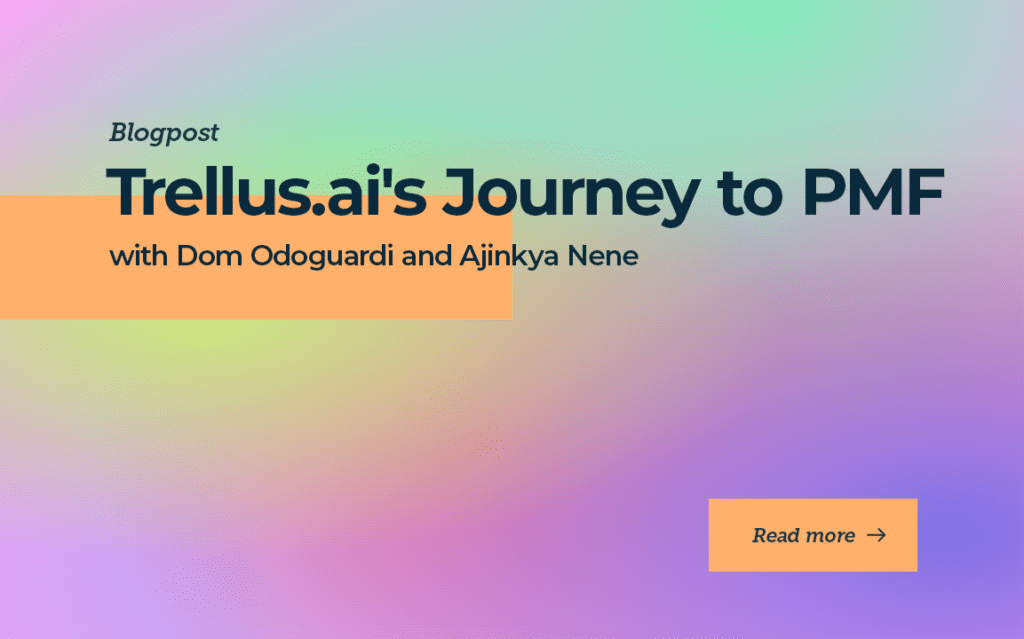Trellus.ai’s Journey to PMF

In the world of startups, achieving product-market fit is akin to navigating a complex maze with endless possibilities and just as many dead ends.
The journey of Trellus, as shared by Dom and Ajinkya on the Predictable Revenue podcast hosted by Collin Stewart, offers a candid exploration of this intricate process, shedding light on the trials, errors, and eventual insights that pave the way to success.
Finding Their Footing in the SaaS World
Ajinkya Nene and his co-founder began their venture as MIT research engineers without SaaS industry experience. Their initial vision was propelled by a belief in the rapidly evolving capabilities of AI models, particularly in enhancing real-time audio and voice recognition software.
This led to the creation of Trellus, a tool initially envisioned as a Zoom coach to improve live communication, which eventually morphed into a sophisticated platform designed to optimize sales calls.
Listening to the Market
Trellus’s journey underscores a critical lesson for founders: the importance of engaging directly with your intended market.
Ajinkya admits that a cerebral approach marked their early days. They hypothesized about potential solutions without substantial engagement with their target users in isolation. This changed when they began to leverage LinkedIn, reaching out to thousands of users to gauge their needs and pain points directly.
This pivot from introspection to interaction was a turning point, emphasizing the value of real-world conversations over theoretical problem-solving.
Salespeople as a Catalyst for Growth
The founders discovered a particular resonance with sales professionals, who not only were more accessible and responsive on LinkedIn but also shared valuable insights that shaped Trellus’s development. This interaction highlighted a significant aspect of product-market fit: the importance of choosing the right audience.
Salespeople’s openness to new tools and frequent presence on LinkedIn made them an ideal initial user base for Trellus, driving the platform towards features that directly addressed sales efficiency and effectiveness.
Leveraging Feedback for Product Evolution
Through hundreds of conversations, Trellus evolved from a concept to a tool that addresses the core needs of sales teams.
The founders learned to balance being opinionated about their product’s direction and being open to user feedback. This iterative process of hypothesis, feedback, and revision led to a deeper understanding of the sales process and the development of features that genuinely aid sales professionals in improving their call efficiency and conversion rates.
Persona-Based Outreach in Product Development
The Trellus founders’ experience with LinkedIn outreach reveals an essential lesson in persona-based marketing and product development.
They discovered that sales professionals were significantly more receptive to engaging with them, highlighting the effectiveness of targeting the right personas through appropriate channels. This is crucial for startups looking to connect with potential users and validate their ideas efficiently.
By identifying and understanding the habits and preferences of their target personas, founders can tailor their outreach strategies to maximize engagement and feedback.
Ajinkya detailed the process of using direct feedback to evolve Trellus’s product. Initially focusing on understanding the driving forces behind companies’ pipelines, they identified cold calling as a burgeoning need due to the inefficacy of email campaigns. This approach of asking targeted questions to identify pain points and opportunities is critical for startups looking to adapt and refine their product offerings.
Offering Value-Added Services for Free
Trellus’s tactic of providing a free real-time transcription service to gather data and improve its primary offering of cold call coaching illustrates an innovative way to enter the market, build a user base, and collect actionable insights.
This “wedge” strategy can be a powerful tool for startups seeking to understand their users deeply and refine their core products based on accurate usage data.
Challenges of AI-Based Product Features
A single irrelevant or incorrect suggestion from an AI can significantly erode users’ trust, underscoring the importance of accuracy and relevance in automated systems. To maintain user engagement and trust, startups employing AI in their solutions must prioritize these aspects.
The decision to expand their product ecosystem in response to feedback on the coaching feature highlights a strategic approach to product development.
By adding complementary features such as AI summaries, emails, and analytics, Trellus worked to provide additional value to users while continuing to refine the core coaching feature. This strategy of broadening the product offering can help startups retain users and provide more comprehensive solutions.
The Debate Over Early Monetization
Ajinkya’s reflection on their monetization strategy reveals a vital debate for startups: when to start charging for your product. Initially, Trellus prioritized user growth over revenue, aiming to maximize learning and product improvement.
However, there’s an acknowledgment that introducing charges earlier might have provided more committed feedback and possibly accelerated the product’s refinement. This highlights the delicate balance startups must manage between user growth, product validation, and revenue generation.
Shift to a Market-Driven Approach
Dom Odoguardi transitioned from a user to a key team member at Trellus. This shows the vital role of firsthand product experience and feedback in shaping product development.
His early involvement, from genuine product use and a desire to contribute to its growth, highlights the importance of building a talented team deeply connected to the product’s mission and user experience.
Dom’s initial challenge in selling the AI coaching product reflects a common startup dilemma: having a product that appeals to early adopters without achieving broader market traction.
This situation underscores startups’ need to continually adapt and refine their offerings based on real-world sales experiences and customer feedback.
The difficulties Dom faced, including the disjointedness of using separate platforms for outreach and dialing, acted as a catalyst for innovation, leading to the ideation of the auto-dialer feature.
The Auto Dialer
The auto dialer’s conception, driven by direct sales frustrations and the team’s creative brainstorming, exemplifies the agile responsiveness required in the startup environment.
Ajinkya and Dom’s ability to pivot, grounded in the reality of their sales process and technological possibilities, signals the importance of flexibility and quick iteration in product development.
A critical learning from Trellus’s journey is the strategic decision to not give away the new product for free, unlike their initial approach. This decision reflects a maturation in their business strategy, recognizing the value of their solution and the necessity to build a sustainable revenue model from the outset.
The shift towards a paid model for the auto-dialer, even for users accustomed to receiving free products, illustrates the balance startups must find between user acquisition and financial viability.
Despite the challenges and temptations to pivot to seemingly greener pastures, the founders’ steadfast commitment to the cold-calling domain underscores the importance of focus and perseverance in the startup journey.
This focus, coupled with a willingness to evolve their product within the chosen domain, showcases the nuanced balance between consistency in vision and adaptability in execution.
The Refinement of Trellus’ Sales Approach
Dom mentions moving from a broad, time-consuming engagement with smaller teams to a more streamlined, focused, and, essentially, more efficient sales process. This change improved sales effectiveness and underscored the importance of rigorously qualifying leads and respecting the sales team’s time.
Introducing the auto-dialer and enhancing the Trellus suite have empowered the team to be more strategic and efficient. They emphasize the value of product functionality that directly addresses user pain points and operational inefficiencies.
Qualification Frameworks
Ajinkya’s reflection on the evolution of their sales process and the growing confidence in their product and market fit as they moved from seeing sales as flukes to recognizing patterns and effectively qualifying leads and opportunities is another crucial insight. This evolution highlights the maturation of their business understanding and the strategic direction that has allowed them to focus more effectively on promising leads.
Furthermore, qualification frameworks, like BANT, and their application or misapplication in the sales process provide valuable lessons for startups. The nuanced understanding that these frameworks are tools for better understanding prospects rather than rigid filters to disqualify them prematurely suggests a more thoughtful approach to sales engagement.
Monkey Dialer
A metaphor for the auto dialer’s functionality captures what Trellus aims to achieve: simplifying and automating the mundane aspects of sales tasks to allow sales teams to focus on high-value activities. This strategic pivot addresses a direct need within the sales process and positions Trellus as a solution that enhances both the quantity and quality of sales engagements.
Conclusion
Trellus’s journey from concept to a key player in sales automation underscores a fundamental truth: success in the startup world hinges on genuine engagement with your market and the agility to evolve based on direct feedback.
By shifting from isolation to interaction, Trellus honed its product to meet the real needs of sales teams and underscored the critical balance between innovation and market demands. The development of their autodialer, driven by firsthand challenges and a strategic pivot towards a comprehensive suite, exemplifies the transformative impact of listening closely to those you aim to serve.
Discover Trellus‘ revolutionary features and see how their tools can transform your sales process.
Want to unlock the secrets to scalable sales success? Elevate your sales game. Book a demo call and learn how we can help you boost your sales efforts!
NO TIME TO READ?
Listen On:





